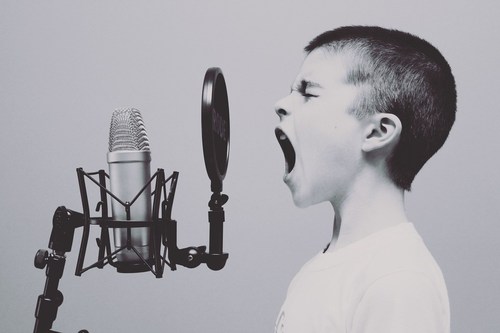 Acappella music is specifically group or solo singing without instrumental accompaniment, or a piece intended to be performed in this way. It contrasts with cantata, which is accompanied singing. When you sing driving down the highway, or in the shower, or spontaneously break out in song, you are singing acapella. Some of us, however, can’t carry a tune in a bucket. We wouldn’t even venture to sing without help from an instrument. You need to strum a guitar, or hit some notes on the keyboard, or even have someone play a harmonica if you are going to sing.
Acappella music is specifically group or solo singing without instrumental accompaniment, or a piece intended to be performed in this way. It contrasts with cantata, which is accompanied singing. When you sing driving down the highway, or in the shower, or spontaneously break out in song, you are singing acapella. Some of us, however, can’t carry a tune in a bucket. We wouldn’t even venture to sing without help from an instrument. You need to strum a guitar, or hit some notes on the keyboard, or even have someone play a harmonica if you are going to sing.
But, sometimes, we find ourselves alone, out on the stage, blinded by the spotlights, having to sing a song all by ourselves. Sometimes, we listen for some accompaniment, we look around desperately—waiting for some help—and it doesn’t show up. Sometimes, the people we have leaned on, the people that usually carry the day for us, the faithful support that we have always counted on, are not there. The audience waits with bated breath for you to break forth in joyful song like you have always done. This is the situation in which Israel found itself. “By the rivers of Babylon, there we sat down, yea, we wept, when we remembered Zion. We hanged our harps upon the willows in the midst thereof. For there they that carried us away captive required of us a song; and they that wasted us required of us mirth, saying, Sing us one of the songs of Zion. How shall we sing the LORD’S song in a strange land?” Psalms 137:1-4 (KJV)
It’s a haunting question. It reverberates in our ears even today. How can you sing when you have lost all reason for singing? How can joy spring from your soul when you are in the midst of a waterless desert? How can you sing of the joy of sunlight when you are swallowed up by the darkness of night? But what the Jews in exile didn’t realize at the time—but they found out later—is that even when the music stops, you can still have a song. But the only way that it happens is when the song you sing from your heart does not originate from the music in your ears. And so, the passing of the night and the dawning of the day issues a brand-new challenge to you: You must reconnect with the song.
Let’s go now to a deep, dark, dank prison in Philippi. Paul and his cohort, Silas, had been arrested for the crime of preaching the Lord Jesus Christ in the streets. It was dark. It was cold. Rats were running around. Vermin coated the floors and walls. The chains were heavy and the stocks were rough. The blood circulation may have been cut off and the shrieks and groans of other prisoners were assaulting their ears. “And at midnight Paul and Silas prayed, and sang praises unto God: and the prisoners heard them.” Acts 16:25 (KJV). Midnight is not the best time to sing. At midnight, we would feel like thumping anyone who started singing. The pain worsens, the spirit sinks, the gloom and doom seem the most suffocating at midnight. Someone has said that you’ll never know how strong you are until your only option is being strong. Suddenly, a great earthquake shook the foundations of the prison, setting Paul and Silas free. Their concert brought down the house!
But in the strict sense of the word, we’re not really talking about singing, are we? We’re talking about a reconnection with the presence and power of God. We’re talking about a deep, soul-stirring, life-rearranging revival that leads us into the very throne room of the Almighty. Regardless of what the past took away from you, it did not kill the Lord’s song. It did not negate the love of God from encircling you. Remember: when you don’t have the music, you still have a song. When you don’t have accompaniment, you still have your God! Sing away! He’s all you need.